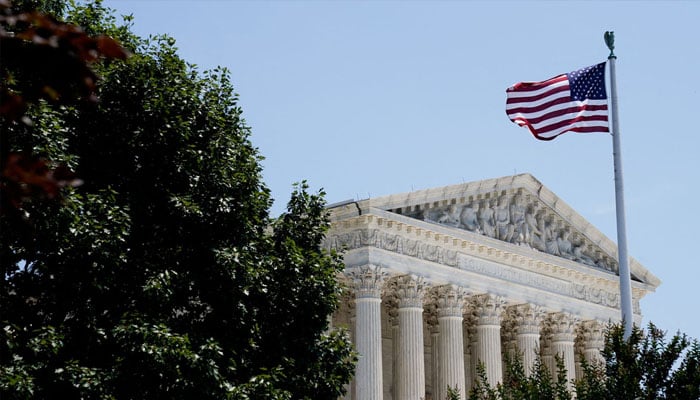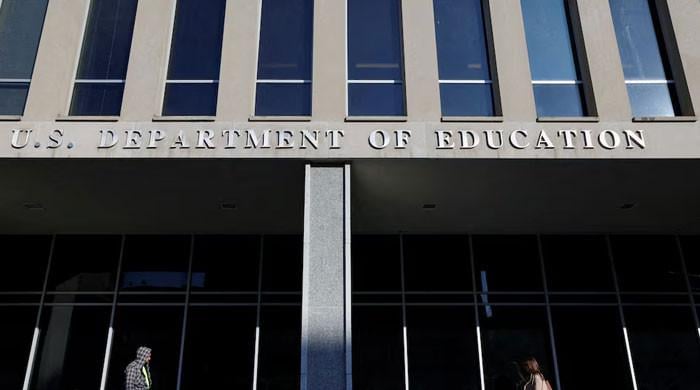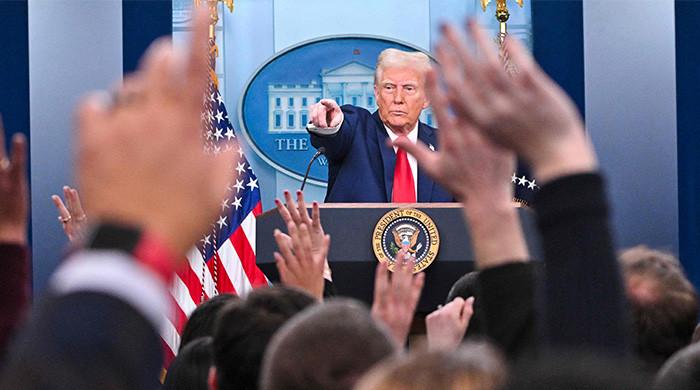US Supreme Court limits government powers to curb greenhouse gases
The decision sets back Biden’s hopes of using the EPA to bring down emissions to meet global climate goals
July 01, 2022

- Biden calls "another devastating decision that aims to take our country backwards."
- Conservatives applauds the decision as a strike against overregulation.
- The three-member liberal minority of the court castigate the majority for overruling powers.
WASHINGTON: The US Supreme Court ruled Thursday that the government’s key environmental agency cannot issue broad limits on greenhouse gases, sharply curtailing the power of President Joe Biden’s administration to battle climate change.
By a majority of 6-3, the high court found that the Environmental Protection Agency did not have the power to set sweeping caps on emissions from coal-fired power plants, which produce nearly 20 percent of the electricity consumed in the United States.
The decision sets back Biden’s hopes of using the EPA to bring down emissions to meet global climate goals, set in 2015 under the Paris Agreement on climate change.
It was a significant victory for the coal mining and coal power industry, which was targeted that same year for tough limits by the administration of then-president Barack Obama in an effort to slash carbon pollution.
It also marked a victory for conservatives fighting government regulation of industry, with the court’s majority including three right-wing justices named by former president Donald Trump, who had sought to weaken the EPA.
Biden called it "another devastating decision that aims to take our country backwards."
"We cannot and will not ignore the danger to public health and existential threat the climate crisis poses."
Stephane Dujarric, spokesman for UN Secretary General Antonio Guterres, said it was "a setback in our fight against climate change."
In the case pitting West Virginia and other coal-mining states against the government, the court said that while EPA had the power to regulate individual plants, Congress had not given it such expansive powers to set limits covering all electricity generating units.
The majority justices said they recognized that putting caps on carbon dioxide emissions to move away from coal power "may be a sensible solution" to global warming.
But they said the case involved a "major question" of US governance with broad consequences, and that the EPA would have to be specifically delegated such powers by the legislature.
The three-member liberal minority of the court castigated the majority for overruling powers they said EPA did in fact have to address "the most pressing environmental challenge of our time."
"The stakes here are high," Justice Elena Kagan wrote. "Whatever else this court may know about, it does not have a clue about how to address climate change."
Conservatives applauded the decision as a strike against overregulation.
"The Court has undone illegal regulations issued by the EPA without any clear congressional authorization and confirmed that only the people’s representatives in Congress – not unelected, unaccountable bureaucrats –may write our nation’s laws," wrote Senate Republican leader Mitch McConnell, who represents Kentucky, a state with a significant coal mining industry.
Michelle Bloodworth, president of America’s Power, a coal industry lobby, cheered the ruling.
"We are pleased the court agreed with us that EPA does not have unlimited authority to do anything it wants to do," she said in a statement.
"Coal-fired power plants provide affordable and reliable electricity," she added.
But House Democratic leader Nancy Pelosi called it a "radical" decision by "pro-pollution justices."
"By restricting the EPA’s authority, the Republican supermajority on the court has bowed to the dirty energy special interests who seek to poison the air our children breathe and the water they drink with impunity," she said in a statement.
Environmental groups called on the Democratic-controlled Congress to take more action on climate change, with more investments in things like clean energy and public transit.
"This means Congress has an even stronger imperative to act boldly – and fast," the Sierra Club said.
Thursday’s decision capped a term for the court in which the new conservative majority flexed its muscles in ways that will have profound effects on American society.
Two similar 6-3 decisions last week shook the country. One expanded the rights of gun owners to wear their guns wherever they go, with few limitations.
The second ended a half-century-old constitutional right to abortion, setting off a chain reaction in which more than half of the 50 states are moving to ban or severely restrict the practice.
The EPA ruling, too, could have profound impacts.
Conservative Justice Neil Gorsuch wrote separately that the decision was a statement that no government agency can make policies with far-reaching effect without express empowerment by Congress.
"When an agency claims the power to regulate vast swaths of American life, it not only risks intruding on Congress’s power, it also risks intruding on powers reserved to the States," Gorsuch wrote.
But critics said that ignores the deep divisions in Congress that have stifled important policy debates.
"By insisting instead that an agency can promulgate an important and significant climate rule only by showing ‘clear congressional authorization’ at a time when the court knows that Congress is effectively dysfunctional, the court threatens to upend the national government’s ability to safeguard the public health and welfare," said Richard Lazarus, a professor at Harvard law school.











